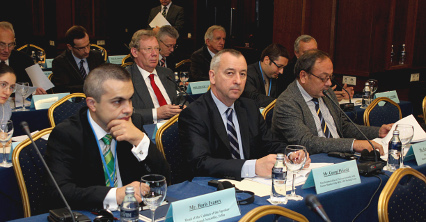
Organizations such as the Parliamentary Dimension of the Process of Cooperation in South East Europe could tackle specific problems of and serve as tools for the countries in the region to get closer and overcome their differences. These are words excerpt of the speech delivered by Yanaki Stoilov, chairman of the Foreign Policy Committee at the seminar organized by the National Assembly on: “Legal statuses and political functions of the interparliamentary organizations”. The forum is organized by the Regional Secretariat for Parliamentary Cooperation in South East Europe.
Yanaki Stoilov spoke about the role of the interparliamentary organizations in international and regional cooperation. The experience shows that such organizations are more effective where the branch in charge of parliament is in close interaction with the one of the government, he said. The parliamentary dimension will be one of the advantages of the process for deepening of the relations. Such cooperation could contribute to the formulation of the common interests of the countries in South East Europe, noted the Foreign Policy Committee chairman. In his view such cooperation despite the one going on in the framework of the European Union is not a deficiency but an advantage.
The 40th National Assembly’s Chairman and member of the Work Group on the Parliamentary Dimension of the Process for Cooperation in South East Europe /PCSEE/, Georgi Pirinski, acquainted the participants in the seminar with the stages in the development of the PCSEE. He noticed that since 2010 to the present, the group has held 10 meetings, where elaborated were two models of the structure of the future parliamentary assembly.
He mentioned the proposal of the Turkish colleagues was to create an Assembly that is to resemble an institution with complicated structure and organs and supporting staff. He explained the Bulgarian National Assembly had proposed a lighter and cheaper form that foresees annual meetings of the heads of parliaments and a plenary session, presided on a rotational basis. The countries will be represented by delegations consisting of 3-5 deputies, elected by their parliaments.
The parliamentary organization is to have 3 commissions – economic, for security and on social issues. The 3 commissions will present reports before the Parliamentary Assembly. Georgi Pirinski underscored the proposal of Bulgaria is based on the experience of the Baltic Assembly, which has proved to be effective and efficient form of regional cooperation and which has formulated and submitted issues of regional importance for consideration to higher world level.
The parliamentary seminar “Legal statuses and political functions of interparliamentary organizations” was opened by the President of the National Assembly Mihail Mikov.
The Process for Cooperation in South East Europe is a political forum for dialogue and partnership between the countries in the region, founded in 1996 at the meeting held in Sofia, Bulgaria of the foreign ministers of the countries in the region. In 2010 a decision was reached to institutionalize the parliamentary dimension of the PCSEE and the First session of the future Assembly of the organization is expected to take place in the spring of 2014.

- 22/04/2021
The Parliament imposed a moratorium on concessions, real estate deals and appointments pending the election of a new cabinet or caretaker government - 16/04/2021
By 156 votes “in favour”, the National Assembly accepted the resignation of the Council of Ministers with Prime Minister Boyko Borisov - 15/04/2021
Speech by Mrs. Iva Miteva upon her election as a President of the 45th National Assembly - 15/04/2021
The Member of Parliament Iva Miteva was elected President of the 45th National Assembly - 15/04/2021
The Members of the 45th National Assembly were officially sworn in - 03/03/2021
The President of the National Assembly Tsveta Karayancheva and MPs attended the solemn fireworks-retreat on the occasion of the Liberation of Bulgaria - 03/03/2021
Every Bulgarian should preserve and honour the memory of those glorious ancestors, thanks to whom Bulgaria exists today, said the President of the National Assembly Tsveta Karayancheva in Gabrovo - 03/03/2021
Today we are on Shipka to pay our respects to all the heroes who sacrificed their lives for freedom, said the President of the National Assembly Tsveta Karayancheva after climbing Shipka Peak together with young people from all over the country - 02/03/2021
The Vice-President of the National Assembly Valeri Simeonov received an award from the Bulgarian Republican Self-Government in Hungary - 26/02/2021
The Parliament adopted at second reading amendments to the Measures Against Money Laundering Act
 Български
Български English
English